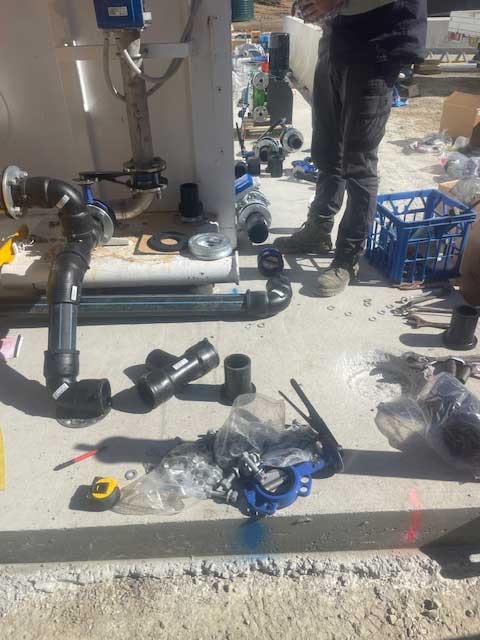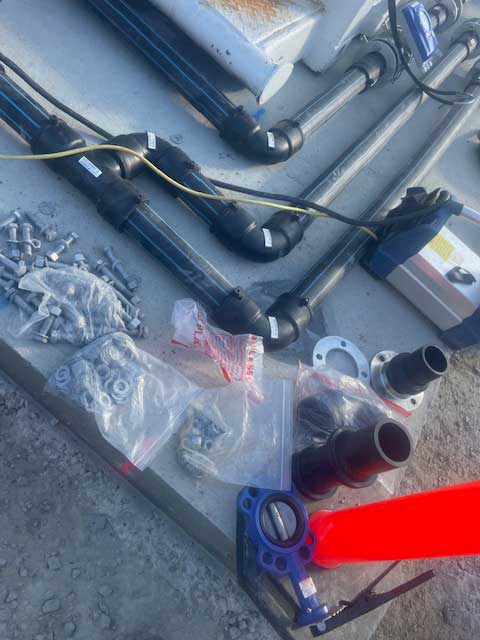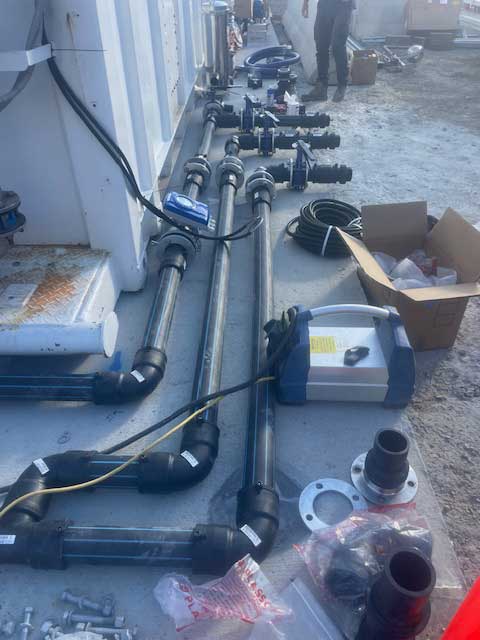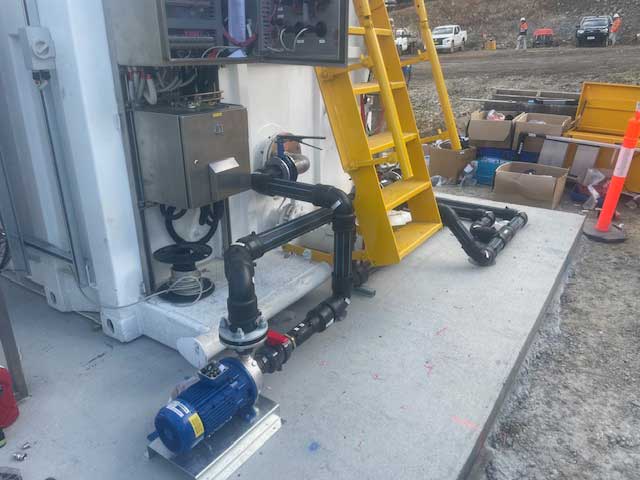Embarking on an industrial pipe installation is no easy feat. It requires meticulous planning, precise measurements, and the expertise of a licensed plumber. In this article, we delve into the journey of an industrial pipe installation, gaining insights from a knowledgeable professional who has successfully tackled countless projects.
From the initial assessment to the final testing, every step of the installation process is critical. Our licensed plumber provides valuable insights on selecting the appropriate pipe materials, ensuring the installation complies with regulations, and overcoming common challenges encountered along the way.
Discover the intricacies involved in laying the foundation for a successful industrial pipe installation and the importance of using high-quality materials that withstand the demands of heavy-duty applications. Gain a deeper understanding of the careful planning required to ensure the system operates efficiently and effectively.
Whether you’re a professional plumber or simply curious about the inner workings of an industrial pipe system, this article provides a comprehensive view of the journey from start to finish. So, join us as we explore the world of industrial pipe installations and learn from the experiences of a licensed plumber.
The role of a licensed plumber in industrial pipe installation
The role of a licensed plumber in industrial pipe installation is paramount. These professionals possess the necessary expertise, training, and industry experience to ensure the successful completion of complex industrial pipe projects. Their in-depth knowledge of plumbing codes, regulations, and best practices is crucial in navigating the intricacies of industrial pipe installations.
Licensed plumbers are responsible for conducting a thorough assessment of the site and the specific requirements of the industrial pipe system. They meticulously evaluate the layout, identify potential obstacles, and determine the appropriate pipe materials and fittings to be used. This comprehensive analysis allows them to develop a detailed plan that takes into account the unique challenges and constraints of the industrial environment.
Moreover, licensed plumbers play a crucial role in ensuring the safety and compliance of the industrial pipe installation. They are well-versed in the latest safety protocols and regulations, such as OSHA (Occupational Safety and Health Administration) standards, and they prioritise the protection of both the workers and the surrounding environment. Their expertise in identifying and mitigating potential hazards helps to minimise the risk of accidents, property damage, and environmental impact during the installation process.
Understanding the different types of industrial pipes

Industrial pipe systems come in a wide variety of materials, each with its own unique properties and applications. Understanding the characteristics of these different pipe types is essential for selecting the most suitable option for a specific industrial project.
One of the most common industrial pipe materials is steel. Steel pipes are known for their exceptional strength, durability, and resistance to high temperatures and pressures. They are commonly used in applications such as oil and gas refineries, chemical processing plants, and power generation facilities. Stainless steel pipes, in particular, offer enhanced corrosion resistance, making them ideal for environments with harsh chemicals or corrosive substances.
Copper pipes are another popular choice for industrial pipe installations. These pipes are highly resistant to corrosion and can withstand a wide range of temperatures and pressures. They are often used in HVAC (Heating, Ventilation, and Air Conditioning) systems, water distribution networks, and various industrial processes that require efficient heat transfer.
Plastic pipes, such as PVC (Polyvinyl Chloride) and HDPE (High-Density Polyethylene), have gained increasing popularity in industrial settings due to their cost-effectiveness, lightweight, and resistance to corrosion. These materials are commonly used in applications like wastewater treatment, chemical transportation, and industrial water supply systems.
The selection of the appropriate pipe material is crucial, as it directly impacts the system’s performance, longevity, and compliance with industry standards. Licensed plumbers possess the expertise to evaluate the specific requirements of the industrial project and recommend the most suitable pipe materials to ensure the system’s long-term reliability and efficiency.
Planning and designing an industrial pipe installation project
Proper planning and design are essential for the successful execution of an industrial pipe installation project. Licensed plumbers play a pivotal role in this phase, leveraging their expertise to develop a comprehensive plan that addresses all the necessary considerations.
The planning process begins with a thorough assessment of the site and the specific requirements of the industrial pipe system. Licensed plumbers carefully evaluate factors such as the available space, the existing infrastructure, the anticipated flow rates, and the required pressure and temperature specifications. This information is then used to create a detailed design that optimises the pipe layout, minimises potential conflicts, and ensures the system’s compliance with relevant codes and regulations.

One of the critical aspects of the planning and design phase is the selection of the appropriate pipe materials and fittings. Licensed plumbers carefully consider factors such as corrosion resistance, temperature and pressure ratings, and the compatibility of the chosen materials with the specific industrial application. They also take into account the long-term maintenance and replacement requirements of the system, ensuring that the design is both efficient and cost-effective.
Another essential component of the planning and design process is the development of a comprehensive safety plan. Licensed plumbers work closely with project stakeholders to identify potential hazards, implement appropriate safety measures, and ensure that the installation process adheres to all relevant safety protocols and regulations. This includes considerations such as the use of personal protective equipment (PPE), the implementation of proper lockout/tagout procedures, and the coordination of work activities to minimise disruptions and potential risks.
By meticulously planning and designing the industrial pipe installation project, licensed plumbers lay the foundation for a successful and efficient execution. This attention to detail helps to mitigate risks, ensure compliance, and ultimately deliver a reliable and high-performing industrial pipe system that meets the specific needs of the client.
The process of industrial pipe installation
The process of industrial pipe installation is a complex and multifaceted endeavour that requires the expertise and coordination of licensed plumbers. From the initial site preparation to the final testing and commissioning, each step of the installation process is critical to the overall success of the project.
The first step in the installation process is the preparation of the site. Licensed plumbers work closely with project managers and other trade professionals to ensure that the work area is cleared, properly graded, and ready for the installation of the pipe system. This may involve the removal of existing structures, the excavation of trenches, and the installation of any necessary underground infrastructure, such as drainage systems or concrete foundations.
Once the site is prepared, the licensed plumbers begin the process of laying the pipes. This involves the careful measurement and cutting of the pipes to the appropriate lengths, as well as the installation of the necessary fittings, valves, and other components. Depending on the pipe material, the installation process may involve specialised techniques, such as welding, soldering, or mechanical connections, to ensure a secure and leak-free system.
As the pipe installation progresses, licensed plumbers continuously monitor the work to ensure compliance with industry standards and regulations. They perform regular inspections, conduct pressure tests, and make any necessary adjustments to ensure the system’s integrity and functionality. This attention to detail is crucial, as any deviations from the design specifications or installation protocols can have significant consequences, such as leaks, system failures, or even safety hazards.
Once the pipe installation is complete, the licensed plumbers move on to the final testing and commissioning phase. This involves a comprehensive evaluation of the system’s performance, including flow rates, pressure levels, and temperature regulation. Any issues or discrepancies identified during this phase are promptly addressed, and the system is fine-tuned to ensure optimal efficiency and reliability.
Throughout the entire installation process, licensed plumbers work closely with project managers, construction teams, and other stakeholders to ensure effective communication, coordination, and problem-solving. Their expertise and attention to detail are crucial in delivering a successful industrial pipe installation project that meets the client’s requirements and exceeds their expectations.
Common challenges and troubleshooting in industrial pipe installation
Industrial pipe installation projects often present a unique set of challenges that require the expertise and problem-solving skills of licensed plumbers. From navigating complex site conditions to addressing unexpected issues, these professionals are equipped to overcome obstacles and ensure the successful completion of the project.
One of the common challenges in industrial pipe installation is the presence of existing infrastructure, such as underground utilities, structural foundations, or other building components. Licensed plumbers must carefully survey the site, identify potential conflicts, and develop innovative solutions to route the pipe system around these obstacles without compromising the system’s integrity or functionality.

Another challenge that licensed plumbers frequently encounter is the need to work in confined or restricted spaces. Industrial facilities often have limited access and tight clearances, which can make the installation process more complex and challenging. Licensed plumbers must be skilled in manoeuvring and working in these tight spaces, utilising specialised tools and techniques to ensure the safe and efficient installation of the pipe system.
Corrosion is another significant concern in industrial pipe installations, particularly in environments with harsh chemicals, high temperatures, or exposure to the elements. Licensed plumbers must carefully select the appropriate pipe materials and coatings to mitigate the risk of corrosion and ensure the long-term durability of the system. They also play a crucial role in developing preventive maintenance strategies to prolong the system’s lifespan and minimise the need for costly repairs or replacements.
In addition to these challenges, licensed plumbers may also encounter unexpected issues during the installation process, such as equipment failures, material defects, or unforeseen site conditions. In these situations, their extensive training and problem-solving skills come into play, as they quickly assess the situation, identify the root cause, and implement effective solutions to keep the project on track.
By leveraging their expertise and experience, licensed plumbers are able to navigate the complexities of industrial pipe installation projects, anticipate potential challenges, and develop effective strategies to overcome them. This ability to troubleshoot and adapt to changing conditions is a critical asset in ensuring the successful completion of industrial pipe installation projects.
Safety precautions in industrial pipe installation
Safety is of paramount importance in the context of industrial pipe installation projects. Licensed plumbers are acutely aware of the potential hazards and risks associated with these types of installations and take comprehensive measures to ensure the protection of workers, the surrounding environment, and the integrity of the pipe system itself.
One of the primary safety considerations in industrial pipe installation is the use of personal protective equipment (PPE). Licensed plumbers and their teams are required to wear appropriate PPE, such as hard hats, safety glasses, gloves, and steel-toed boots, to minimise the risk of injury. They also ensure that all workers are properly trained in the use and maintenance of PPE to maintain its effectiveness.
Another crucial safety aspect is the implementation of proper lockout/tagout procedures. This involves the isolation of energy sources, such as electricity or pressurised systems, to prevent the inadvertent activation of equipment during the installation process. Licensed plumbers are well-versed in these protocols and work closely with project managers and other stakeholders to ensure that all necessary safety measures are in place.
Hazardous materials management is another critical component of industrial pipe installation safety. Licensed plumbers are trained to identify and handle hazardous substances, such as chemicals, solvents, or asbestos, in accordance with applicable regulations and industry best practices. They also develop comprehensive plans for the safe disposal of these materials, ensuring that the installation process does not pose a threat to the environment or the surrounding community.
In addition to these safety protocols, licensed plumbers also prioritise the implementation of effective communication and coordination strategies. They work closely with other trade professionals, such as electricians, HVAC technicians, and construction workers, to ensure that all activities are synchronised and potential conflicts are identified and addressed proactively. This collaborative approach helps to minimise the risk of accidents and ensures the overall safety of the industrial pipe installation project.
By prioritising safety at every stage of the industrial pipe installation process, licensed plumbers demonstrate their commitment to protecting the well-being of workers, the environment, and the integrity of the pipe system. This dedication to safety is a hallmark of their expertise and a key factor in the successful completion of industrial pipe installation projects.
The significance of hiring a licensed plumber for industrial pipe installation

In the realm of industrial pipe installation, the expertise and professionalism of a licensed plumber are indispensable. From the initial planning and design stages to the final testing and commissioning, these skilled professionals play a pivotal role in ensuring the successful execution of complex industrial pipe projects.
Licensed plumbers possess a deep understanding of the different types of industrial pipes, their unique properties, and their suitability for various applications. Their ability to select the appropriate materials and design an efficient, compliant, and cost-effective pipe system is a testament to their technical expertise and industry knowledge.
Moreover, licensed plumbers are well-versed in navigating the challenges and obstacles that often arise during industrial pipe installation projects. Their problem-solving skills, adaptability, and commitment to safety make them invaluable assets in overcoming unexpected issues and ensuring the smooth progress of the installation process.
Equally important is the role of licensed plumbers in maintaining the long-term reliability and performance of industrial pipe systems. Through regular inspections, preventive maintenance, and compliance with industry standards, they help to extend the lifespan of these critical infrastructure components, minimising downtime and reducing the overall operating costs for industrial facilities.
In conclusion, the significance of hiring a licensed plumber for industrial pipe installation cannot be overstated. These professionals bring a wealth of knowledge, expertise, and dedication to the table, ensuring that industrial pipe systems are installed, maintained, and operated with the highest standards of quality, safety, and efficiency. By entrusting their industrial pipe projects to licensed plumbers, clients can be confident in the successful outcome and the long-term performance of their critical pipe infrastructure.

